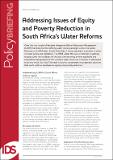| dc.contributor.author | Movik, Synne | |
| dc.contributor.author | van Koppen, Barbara | |
| dc.coverage.spatial | South Africa | en_GB |
| dc.date.accessioned | 2014-10-23T10:28:48Z | |
| dc.date.available | 2014-10-23T10:28:48Z | |
| dc.date.issued | 2014-10-14 | |
| dc.identifier.issn | 1479 974X | |
| dc.identifier.uri | https://opendocs.ids.ac.uk/opendocs/handle/20.500.12413/4864 | |
| dc.description.abstract | Over the last couple of decades Integrated Water Resources Management (IWRM) has become the defining water policy paradigm across the globe. Drawing on IWRM ideas, South Africa has in many ways been a pioneer in terms of water policy and legislation. The 1998 Water Act was an attempt at getting to grips with the injustices of the past and ensuring a more equitable and
sustainable management of the country’s water resources. However, it attempted to do too much, too fast. The need is now to concentrate on pragmatic solutions that work, with an emphasis on equity and poverty reduction. | en_GB |
| dc.language.iso | en | en_GB |
| dc.publisher | Institute of Development Studies | en_GB |
| dc.relation.ispartofseries | IDS Policy Briefing;79 | |
| dc.rights | Readers are encouraged to quote and reproduce material from the IDS Policy Briefing series. In return, IDS requests due acknowledgment and quotes to be referenced as above. | en_GB |
| dc.rights.uri | http://www.ids.ac.uk/files/dmfile/IDSOpenDocsStandardTermsOfUse.pdf | en_GB |
| dc.subject | Water | en_GB |
| dc.title | Addressing Issues of Equity and Poverty Reduction in South Africa’s Water Reforms | en_GB |
| dc.type | IDS Policy Briefing | en_GB |
| dc.rights.holder | Institute of Development Studies | en_GB |
| dc.identifier.team | Knowledge Technology and Society | en_GB |

